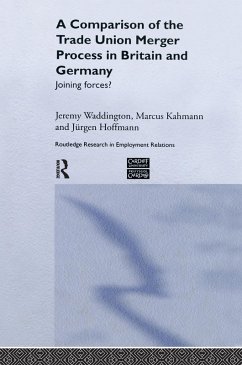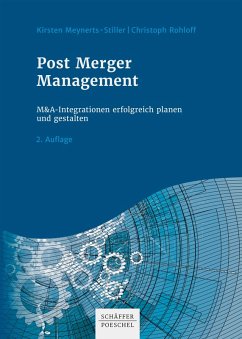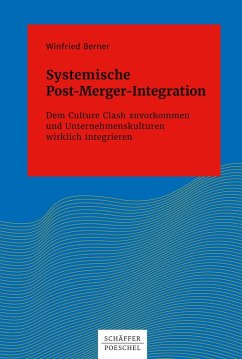
A Comparison of the Trade Union Merger Process in Britain and Germany (eBook, PDF)
Joining Forces?
Versandkostenfrei!
Sofort per Download lieferbar
33,95 €
inkl. MwSt.
Weitere Ausgaben:

PAYBACK Punkte
17 °P sammeln!
Trade unions in Europe are currently facing a series of challenges that stem from changes to regulatory and production regimes implemented by the state and employers, in order to compete in an increasingly internationalized economy. In response to these challenges, trade union movements have been dramatically restructuring; long-standing principles of organization have been jettisoned in an attempt to develop new structures. Central to this process of structural adaptation are the mergers of trade unions.This informative book focuses on the merger process in Britain and Germany and, uniquely, ...
Trade unions in Europe are currently facing a series of challenges that stem from changes to regulatory and production regimes implemented by the state and employers, in order to compete in an increasingly internationalized economy. In response to these challenges, trade union movements have been dramatically restructuring; long-standing principles of organization have been jettisoned in an attempt to develop new structures. Central to this process of structural adaptation are the mergers of trade unions.
This informative book focuses on the merger process in Britain and Germany and, uniquely, it reviews the wider implications of these developments - particularly for North America. As well as addressing the reasons for mergers, the book also examines the process whereby mergers are concluded, investigates the consequences, and analyses the costs and benefits of the post-merger organisation. Drawing on interviews conducted with senior policy-makers engaged in merger processes, this book explores the extent of internal union reform brought about by the merger process, and also identifies the implications of this reform for trade unions world-wide. Structured in distinct sections, this book covers topic such as:
This book forms part of the Routledge Research in Employment Relations series featuring works of high academic merit drawn from a wide range of academic studies in the social sciences. It is a valuable resource for postgraduate students studying business and management, industrial employee relations, and trade unions.
This informative book focuses on the merger process in Britain and Germany and, uniquely, it reviews the wider implications of these developments - particularly for North America. As well as addressing the reasons for mergers, the book also examines the process whereby mergers are concluded, investigates the consequences, and analyses the costs and benefits of the post-merger organisation. Drawing on interviews conducted with senior policy-makers engaged in merger processes, this book explores the extent of internal union reform brought about by the merger process, and also identifies the implications of this reform for trade unions world-wide. Structured in distinct sections, this book covers topic such as:
- what distinguishes the British and German systems?
- trade union structures
- pre-merger issues settling the terms of the mergers
- post-merger developments.
This book forms part of the Routledge Research in Employment Relations series featuring works of high academic merit drawn from a wide range of academic studies in the social sciences. It is a valuable resource for postgraduate students studying business and management, industrial employee relations, and trade unions.
Dieser Download kann aus rechtlichen Gründen nur mit Rechnungsadresse in A, B, BG, CY, CZ, D, DK, EW, E, FIN, F, GR, HR, H, IRL, I, LT, L, LR, M, NL, PL, P, R, S, SLO, SK ausgeliefert werden.













